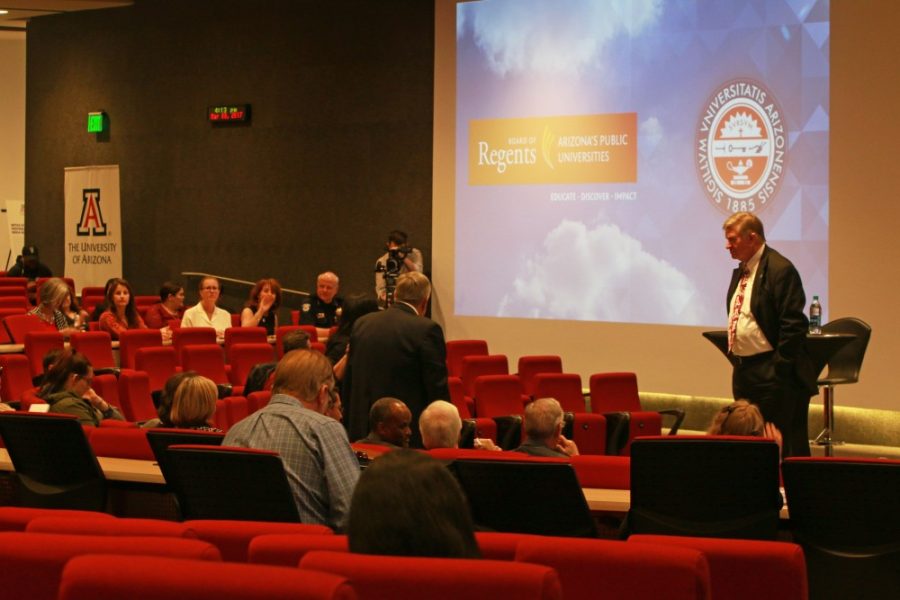The finalist for the UA presidency, Robert C. Robbins, visited campus today to meet with staff, faculty and students in his first public appearance at UA.
The Arizona Board of Regents presented Robbins as the finalist for the UA presidential search, which began in October, yesterday in Phoenix. Contract negotiations for his presidency will begin on March 13, and he hopes to maintain the position for the next 10-15 years.
Robbins admitted to secret visits to the campus as far back as three months ago, joking about donning a baseball cap and interacting with students under the guise of a parent to a prospective student.
Currently CEO of Texas Medical Center, the largest medical center in the country, Robbins considers himself an academic following 20 years in various capacities at Stanford University.
He sees many opportunities to improve different aspects of UA in sustainability, accountability, the use of resources and the university economy.
“One of my objectives as I take this leadership role is to better understand and better tell the story—the great story—that I think we have here at UA,” he said. “I think we don’t get the coverage and the attention that we deserve.”
Robbins also says he is “acutely aware” of the intersection of education and technology in a rapidly changing world, especially as it pertains to the current generation of college students, and hopes to leverage that relationship to increase retention and graduation rates.
“I think the world is changing,” he said. ”I think it’s changing in ways that we need to be, and I think are well positioned, to be leaders in the area of diversity, of access, of affordability to the students we’re attracting to the university.”
Part of Robbins’ vision for the future of UA is to help develop relationships with local business partners to not only provide internships, but also bring those businesses in to help educate students.
That model will also help UA become more integrated in the local entrepreneurship sector by providing resources to economize the innovative projects produced by the university.
“We should be part of the catalyst—the supercharger—for this type of effort,” he said. “I think it’ll have not only returns financially, but I think it’ll help the economic development of the community.”
This seems to be part of Robbins’ efforts to help generate more funding for the university without expecting to fully regain state funding.
“They’re gonna say, ‘look how well you’ve done without this funding; you don’t really need us,'” he said. “We have to be at the table.”
But he’s also looking at alternative cost measures such as out-of-state and international student tuition, investing in new technology and partnering with businesses, in addition to reducing expenditures at the university.
After a brief opening statement, Robbins fielded questions from the audience of administrators, faculty and students.
ASUA Sen. Kincaid Rabb, who represents the College of Fine Arts, asked the incoming president about how he’ll support the arts on campus. Robbins responded by acknowledging the dance and theater programs and the influence the arts had on him during his time at Millsap College in Mississippi, later adding that he hopes to attend the performances.
“You’ll probably find me out on the campus a lot, going to many events—sporting events, fine arts performance events,” he said. “I expect to be out and active and engaged.”
Women and Gender Studies junior, Stefano Saltalamacchia, asked the potential president about how he intends to ensure a safe campus for marginalized student groups.
“I think that any student on our campus should feel special, should feel respected, should be treated with compassion no matter where the come from and what their beliefs systems are and values are,” Robbins said. “We need to be good stewards of that and give the highest quality education in the safest, most protected environment where there’s a fair and just culture that we need to be a haven where different opinions can be exercised.”
Finally, one student asked Robbins about UA’s position close to the border and the status of Deferred Action for Childhood Arrivals students. He largely deferred to the regents’ policy on DACA students, but said he’d act in accordance with the law on the matter.
“We’ll protect them to the utmost that we can under the law, but we are obliged to follow the rule of law here,” he said.
Robbins confirmed that he is certainly taking a pay cut to come to the UA as president. He said money does not motivate him and that he’s enthusiastic about the mission.
“The reason I wanted to come to the University of Arizona is to return to academic life,” he said. “I think it’s the highest calling you could have.”
Follow Nick Meyers on Twitter.









